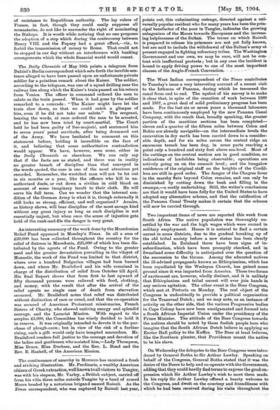Two important items of news are reported this week from
South Africa. The native population was thoroughly un- settled by the war and the high wages which were earned in military employment. Hence it is natural to find a certain unrest in some districts, due to the gradual breaking up of the old tribal society before a new status has been clearly established. In Zululand there have been signs of in- subordination, which have been promptly checked, and in Swaziland some difficulty is anticipated over the question of the succession to the throne. Among the educated natives the ill-advised propaganda known as Ethiopianism, which has been repudiated by the Wesleyan Church, has gained some ground since it was imported from America. These two forms of excitement are, however, wholly distinct, and it is unlikely that Ethiopianism and tribal unrest will ever join hands in any serious agitation. The other event is the Boer Congress, which met at Pretoria on Monday. The real object of the Congress is undoubtedly to provide a political organisation for the Transvaal Dutch ; and we may note, as an instance of activity on the other side, that the various Progressive bodies in Cape Colony have now been amalgamated and formed into a South African Imperial Union under the presidency of the Prime Minister. The attitude of the Boer Congress towards the natives should be noted by those foolish people here who imagine that the South African Dutch believe in applying an Exeter Hall policy to the Kaffirs. The Boer at least believes, like the Southern planter, that Providence meant the native to be his slave.






































 Previous page
Previous page